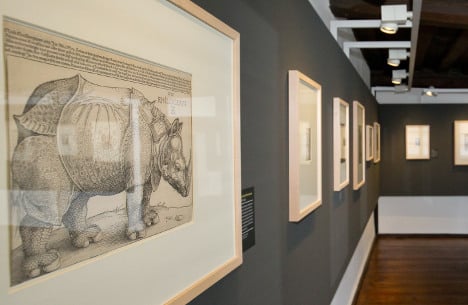Karl Diehl, a native of the city, left 143 works by the Nuremberg-born painter and printmaker to his hometown.
The collection includes copper engravings, etchings and woodcut prints by Dürer, who was active in the late 15th and early 16th centuries and became famous across Europe for the quality of his work – which remains an object of fascination to art historians and critics to this day.
 A copper engraving titled “Adam and Eve” by Albrecht Dürer, dating back to 1504, on display in Nuremberg. Photo: DPA
A copper engraving titled “Adam and Eve” by Albrecht Dürer, dating back to 1504, on display in Nuremberg. Photo: DPA
“This artistic trove will help us to underline our identity as the city of Dürer and to drive it forward,” Nuremberg's Lord Mayor Ulrich Maly said.
Art historians estimate the total value of the Diehl collection in the low millions.
Legacy with a dark past
A controversial figure who belonged to the Nazi party under the Third Reich, Diehl built his father's family firm into an industrial powerhouse – in part through weapons contracts for the Hitler regime.
Like many large German firms, his company used forced labourers and concentration camp inmates in its factories.
But the business continued after the end of the Second World War, and the company remained controversial for its manufacture of items including landmines, guided missiles and tank tracks alongside its civilian product lines during the Cold War.
In the mid-1990s Diehl passed on the business to his family and sought to reinvent himself as a patron of the city, building up foundations he had started during his years at the top of the company, before his death aged 100 in 2008.
Diehl's Dürer legacy is open to the public in the Albrecht-Dürer-Haus museum between April 15th and July 17th in a special exhibition.
 A woodcut by Albrecht Dürer titled “The Resurrection of the Christ”, dated 1510, on display in Nuremberg. Photo: DPA
A woodcut by Albrecht Dürer titled “The Resurrection of the Christ”, dated 1510, on display in Nuremberg. Photo: DPA



 Please whitelist us to continue reading.
Please whitelist us to continue reading.
Member comments